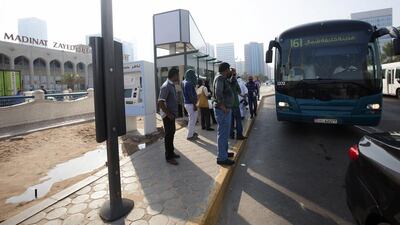When a citywide bus service was launched in Abu Dhabi in 2008, it brought relief to a large number of people who could not afford the cost of running a car. During the first six months of operation, when no charge was made for the service, an estimated 50,000 people used the 120 buses that operated on nine routes around the city. Those numbers climbed dramatically even after a fare of Dh1 was introduced but, as The National reported yesterday, since fares were doubled to Dh2 two years ago, they have fallen by 14 million passenger journeys.
The dip in usage – despite the addition of 15 routes to the network and an increase in the number of buses available at peak times – is a strong indicator of how price sensitive much of the city’s population is, particularly those who are struggling to make ends meet amid increasing rents, food and commodity prices.
As rents have risen, so too has the incidence of people illegally sharing accommodation, because when static incomes are combined with the desire to remit as much money as possible to families “back home”, many legal renting options become unaffordable. Last month this newspaper reported on a Pakistani expatriate, Kabir, who decided to send his family back home after municipality warnings compelled him to move out of shared accommodation in Abu Dhabi. Even officials cracking down on villa-sharing in Dubai could see where the issue lay. “If rents go up, surely they will come back again to share,” Jabir Ahmed Al Ali, head of the inspection unit at the emirate’s buildings department told this newspaper earlier.
Low- to medium-income people are an integral part of the country’s economy, serving some of the vital sectors such as construction, health care and hospitality. Keeping the interests of this community in mind, wherever possible, will benefit everyone. Declining passenger numbers, on the other hand, send the starkest possible warning that these people are being squeezed – and that’s good for no one.

